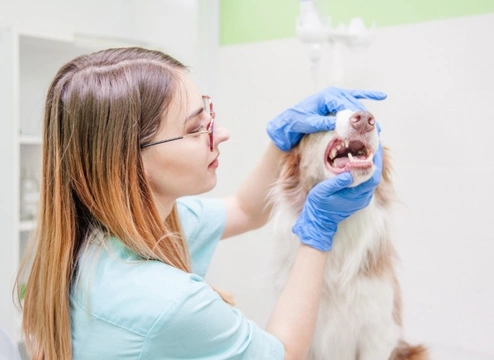
Dog insurance and dental care: What is and is not covered?
Veterinary dental care for dogs is necessary just as much as it is for us humans to see the dentist, both for preventative care and if something goes awry. There is a lot of confusion among dog owners regarding what dog insurance covers in terms of dental care for dogs, and many dog owners are surprised to hear that their insurers won’t provide coverage or pay a claim if their dog needs dental extractions due to things like rotting teeth.
Every dog insurance policy and what it covers is different, and you should refer to the wording of your own policy or the policy you are considering buying carefully to find out what the situation is for your own dog.
Some dog insurers don’t cover certain types of dental issues in their standard policies (even comprehensive ones) but do offer dental cover add-ons too, which can further confuse matters!
Taking into account the caveat to check the specific policy you’re dealing with when it comes to what dental care is or is not covered under your dog insurance policy, this article will tell you what the most common types of coverage are, and what generally isn’t covered, as a guide to dog insurance policy and dental coverage norms.
Dog insurance won’t usually cover preventative dental treatment
Preventative dental treatment is an investment in your dog’s long term health and wellness, and is really important; both to keep your dog happy and healthy and also to save you a potentially large sum of money further down the line.
Preventative dental treatment for dogs includes things like brushing your dog’s teeth (which all dog owners should do but few actually do!) and having dental check-ups for your dog with the vet (usually all included in their annual health check) and any pre-emptive or preventative veterinary dental treatments your vet suggests.
This latter might mean things like having your dog’s teeth scaled and polished under sedation, or tackling problems like gingivitis before they go on to cause worse issues.
Preventative dental treatments aren’t generally covered by dog insurance policies, just as other preventative healthcare for dogs like worming treatments and vaccinations aren’t covered either.
Dog insurance is there to cover the unforeseen and unexpected, not to cover preventative and routine care.
Dog insurance won’t usually cover dental problems that could have been prevented
Say your dog needs veterinary treatment for a dental problem that could have been prevented by proper dental care outlined above. For instance, if you fail to brush your dog’s teeth or to have your vet undertake a proper deep clean and remove plaque and deal with problems when needed, as your dog gets older they’re likely to need more invasive treatment.
This might mean removing teeth, dealing with infections and abscesses, and a number of other more serious treatments that are necessary to stop dental pain (which will often be acute) and allow your dog to eat normally.
As these types of treatments are medically necessary, does dog insurance pay out to cover the cost? No, because they’re conditions that could have been prevented with the appropriate care of your dog’s teeth in the first place.
Dog insurance won’t cover the cost of preventative healthcare nor of things that could have been prevented with said preventative healthcare, and so it won’t fund fixing or mitigating the impact of dental neglect.
Most comprehensive dog insurance policies cover dental problems caused by accidents
Say your dog has an accident; they’re hit by a car or fall and injure their mouth and dentition, perhaps breaking some teeth. The dental side of this obviously needs veterinary treatment; do dog insurance policies cover the cost?
Yes, most comprehensive policies cover the cost of dental care and treatment needed due to an accident, the same as they cover veterinary care for other parts of the body! Teeth are not excluded from most policies in and of themselves, but many dog owners assume they are because pet insurance policies won’t pay out for care that is ultimately needed as a result of dental neglect.
Most comprehensive dog insurance policies cover dental problems caused by insured illnesses
What if your dog had an illness that affected their teeth, and that caused them to need extractions or other forms of dental treatments? Again, most comprehensive policies that cover illness will cover the cost, because once more these types of dental problems are ones that you could not have been expected to foresee or prevent occurring.
Whether or not dental problems caused by hereditary or congenital defects is covered can be variable
Some dog breeds have a hereditary predisposition to certain health conditions or conformation problems that can affect their health, and some of these can be tested for in parent stock prior to breeding.
Whether or not a hereditary health issue or conformation defect that results in the need for veterinary dental care is covered by your dog insurance policy can be variable.
Some policies don’t cover known hereditary health conditions in pedigree dog breeds at all, some do, and every policy wording document may be different.
It is wise to check coverage for hereditary health issues under any policy you might be considering, as this might have large implications for your dog’s coverage in general, not just pertaining to their dental coverage.



